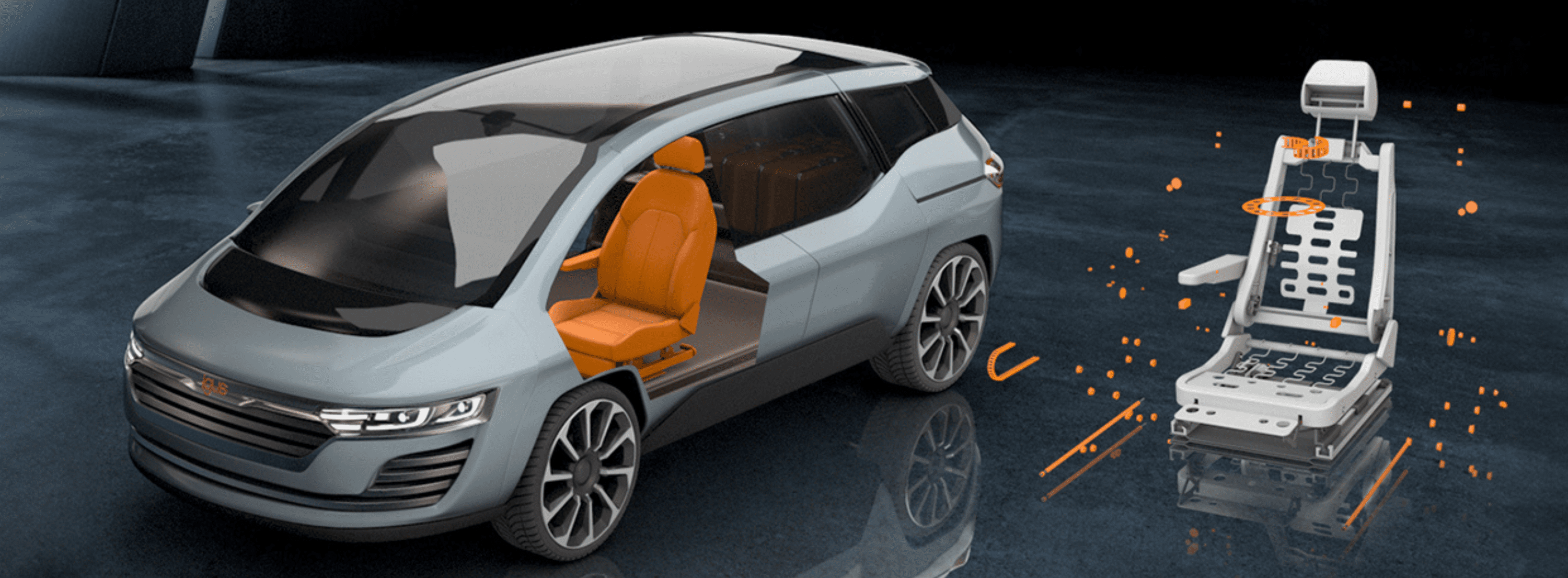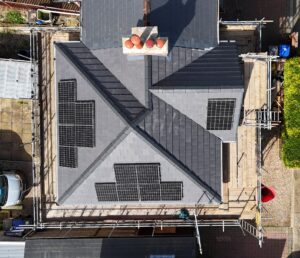Imagine getting into a car with rotating seats that transform into reclining beds at the touch of a button, a steering wheel that disappears into the dashboard, worktables and screens that fold out automatically: this is the future of automotive interiors and igus® is at the forefront of developments, providing advanced components for vehicles old and new.
Every year, igus® manufactures more than 150 million plain bearings, linear units, energy chains and sub-assemblies for the car industry – and the trend has been rising steadily for many years. Typical examples of applications include electric sliding doors, multifunctional centre consoles and various types of seat adjustment: manual and electric, horizontal, rotating or vertical.
Motorists demand reliability in vehicles and igus® has been developing solutions for decades, all of which remove the need for external lubrication of the bearing points providing long lasting, low weight and damping properties.
Dave Spence, igus® engineer and automotive specialist said:
“Our polymer plain bearings are customisable in geometry and up to seven times lighter than conventional metal bushings with PTFE sliding layers.”
They are cost-effective and extremely tough, making them the ideal solution for many applications, e.g. in seats and consoles. Comfortable, smooth travel is synonymous with modern vehicles, and it makes an impression when a display extends automatically, or a seat gently slides into the right place. Squeaking and rattling is a thing of the past and igus® products are part of this transformation.
“Our processes are designed to supply car manufacturers and suppliers with the exact components they need within a short period of time,” added Dave.
igus® designers prove this with online configurators and also with more complex projects. Recently, in a joint project with a Tier 1 supplier, a complete centre console was ready for volume production in four months instead of one year, as was previously the case for the customer.

3D printed vintage car parts
Other manufacturing processes, such as 3D printing can benefit a range of applications, but a particularly niche area is old and rare vehicles. Sourcing replacement parts in good condition is becoming increasingly difficult and 3D printing sought-after parts can provide an exact replica, easily made and cost-effective. At igus®, iglidur® i6 laser sintering material is used as one of the most wear-resistant materials on offer.
For example, in the Stewart Warner speedometer, the gear on the first intermediate shaft which meshes with the worm on the input shaft was no longer in working order. As a result of work done on the speedometer by the previous owner, it was impossible to determine the correct dimensions and so a replacement worm gear was needed that would be tough, precise and low-cost.
With the igus® 3D printing service, a fully functioning spare part was made from iglidur® I6 and the use of self-lubricating polymers meant that the component no longer required lubrication. Even after being in use for more than 2,000 miles, no signs of wear were detectable.
Vintage vehicles aside, the increase in autonomous and semi-autonomous vehicles provides the opportunity for interior designers to navigate new freedoms and challenges. This is especially relevant to new vehicle concepts such as autonomous shuttles, mobile offices or delivery vans.
The introduction of a more flexible interior will require additional bearings and energy supply systems that igus® can provide. Seats and backrests are movable in many axes by means of rotary plain bearings. Rotational movements of screens, tables or seats can use igus slewing ring bearings. Centre consoles, sliding doors and roof segments move quietly and easily with leadscrew drives. There are endless areas of application for igus® parts in the automotive industry and elsewhere.

A concept vehicle in virtual reality
igus® has presented what is already possible with virtual reality: the iguverse, its own virtual reality space hosted at the igus® site in Northampton. The iguverse automotive industry ‘room’ shows many innovative details in a concept vehicle from fully foldable seats to tribopolymer bearings that ensure reliable motion in each of these interior components. The developers know what environmental conditions prevail in and on the car and what requirements OEMs place on materials, delivery quality and certifications so when exploring this concept vehicle, visitors can see the inner workings and the igus® products used to facilitate smooth motion.
Matthew Aldridge, Managing Director at igus® in Northampton, said:
“The type of collaboration in the development phase will also change. In our iguverse, we are constantly expanding the possibilities of the metaverse. In the future, our customers will be able to develop new products digitally alongside our design engineers. This saves travel time and costs.
“Virtual feasibility studies with 3D models can reveal weak points at an early stage – without physical prototypes, one of the many advantages of designing in the iguverse, open to all our customers.”
Ideas for new drive concepts
Automotive experts at igus® are not only concerned about futuristic interiors. They are also developing solutions for new drive concepts – for example, in the pumps and valves used within the cooling system of electric drives. This is where bearings are used that work directly in the coolant. They are made of special self-lubricating plastics that show hardly any swelling behaviour in water and are resistant to most glycols.
From the car manufacturer’s point of view, the use of plain bearings made of ‘performance plastics’ also offers advantages in terms of sustainability and CO2 footprint. The production of the raw material plastic consumes significantly less energy and greenhouse gases than that of steel or aluminium. No lubricants are released during use, the low weight contributes to the reduced energy consumption of the vehicles and the range of materials includes PFAS-free materials. In this way, igus® endeavours to be a catalyst for change and enhance reliability, longevity and sustainability in a range of vehicles.
To explore the future of engineering, contact igus® on 01604 677240 or visit the website.













